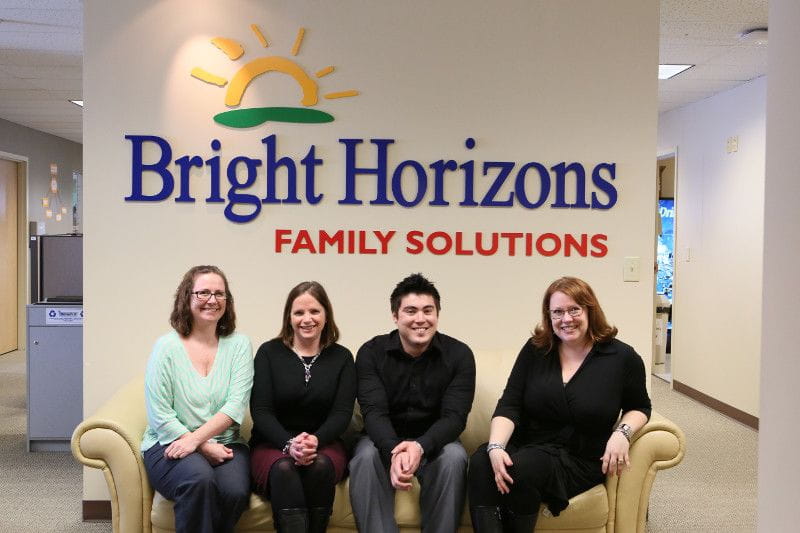I know what you're thinking: It seems like every month, week, and day has a special celebration attached to it - in fact, National Quiche Lorraine Day occurred a couple of days ago, which I gladly celebrated by eating breakfast for dinner.
In all seriousness, though, as we segue into June, we're celebrating Employee Wellbeing Month at Bright Horizons, and hope many other organizations around the world are doing the same. It's one thing to celebrate employee wellbeing for 30 days, but it's a true testament to an organization's purpose and values when they have an employee wellbeing program built into the company structure.
Providing employees with opportunities to deal with physical, mental, financial, and family aspects of their lives, through work-related programs and resources, can help improve overall employee wellbeing. Take a look at four ingredients for a beneficial wellbeing program and learn how to get started:
At Bright Horizons, we recently had a midday walking challenge to see how many miles people could clock across a period of weeks. The fringe benefit of getting people up and moving is that it also connects them to each other. Subsidized gym memberships are also worth considering, but you'll want to make sure it's what your employees really want (and that your chosen gym is readily accessible) lest you throw your money into something they don't use.
And remember: It's not just your employees who will benefit. Employee wellbeing will also increase your bottom line - it's a win-win situation. Celebrate Employee Wellbeing Month by creating a program at your own organization - your employees will thank you.
In all seriousness, though, as we segue into June, we're celebrating Employee Wellbeing Month at Bright Horizons, and hope many other organizations around the world are doing the same. It's one thing to celebrate employee wellbeing for 30 days, but it's a true testament to an organization's purpose and values when they have an employee wellbeing program built into the company structure.
Providing employees with opportunities to deal with physical, mental, financial, and family aspects of their lives, through work-related programs and resources, can help improve overall employee wellbeing. Take a look at four ingredients for a beneficial wellbeing program and learn how to get started:
1. Prioritize Health:
Healthy employees tend to be more productive. And nearly 50% of employees want time for healthy activities at work. In response, many companies have gotten creative, adding workday challenges to get people up and moving. Accenture, for example, has been a trailblazer in this realm. According to their North American Wellness Lead, about half of their employees are on the road at any time, so the company has taken great pains to connect people with exceptionally comprehensive wellness initiatives - for body and mind that can be accessed remotely any time.At Bright Horizons, we recently had a midday walking challenge to see how many miles people could clock across a period of weeks. The fringe benefit of getting people up and moving is that it also connects them to each other. Subsidized gym memberships are also worth considering, but you'll want to make sure it's what your employees really want (and that your chosen gym is readily accessible) lest you throw your money into something they don't use.
2. Encourage Fresh Minds:
One of the major underlying causes of stress is lack of sleep; and one of the major causes of lack of sleep is worrying about work. Is it any wonder a Horizons Workforce Consulting's sleep study showed 60% of employees aren't getting enough sleep each night? These "poor sleepers" are three times as likely as good sleepers to feel burned out at work and six times as likely to feel unable to meet regular job requirements. Some companies are reacting by offering healthy sleep programs; one went as far as to tell employees they could use back-up care solutions - both for children and elders - to get dependents taken care of so they can catch up on sleep. The ultimate goal is to keep employees' minds fresh and productive.3. Educate Financially:
Money is also a major stressor for many employees - 52% of them, to be exact. Some are bogged down by student loan debt, and others aren't sure where to start with planning for retirement. And it's not a salary problem - it's a know-how problem. An employee survey of Bright Horizons' employees a few years ago showed that people couldn't even think about putting money into their 401ks because they couldn't figure out how to budget for today's expenses. In response, we began offering resources including a la carte assistance through our WellBeing Help Center and budgeting and college loan repayment help in Save Smart webinars. The result? Higher-than-ever 401k participation and financially healthier employees. Many employers are starting to additionally assist financial wellness by helping employees pay down some of that $1.3 trillion in college debt.4. Support Families:
Whether or not they're working parents, employees need time for activities outside of work. And many say they're not getting it. Our Modern Family Index showed working parents are struggling, with most saying they're burning out, more than half because they don't have enough time for families. Companies that offer flexibility - allowing people to leave early for their son's soccer game, come in late after a doctor's appointment, or work from home when they need to meet the plumber - make it easy for employees to get their work done while also tending to their lives outside the office. Ask yourself if things like employer-sponsored child care, flex hours, and remote work options would be valuable for your employees. And better yet, ask them. If the answer's yes, start implementing!And remember: It's not just your employees who will benefit. Employee wellbeing will also increase your bottom line - it's a win-win situation. Celebrate Employee Wellbeing Month by creating a program at your own organization - your employees will thank you.





